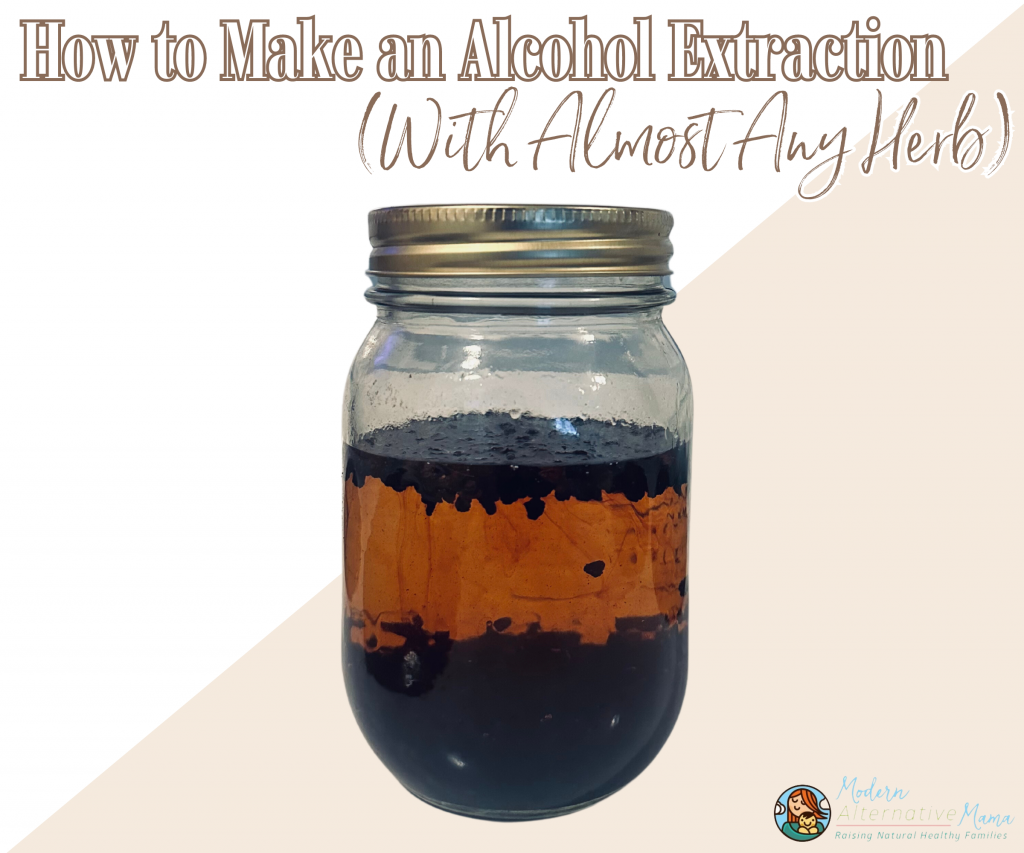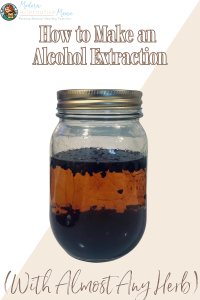I didn’t want to overwhelm myself when I started my herbalism journey, so I experimented with just a few herbs. Instead of buying all the herbs that intrigued me, I focused on a select few. I predominantly focused on lung health, with a side of immunity support.
As someone with an autoimmune disease, I read so much conflicting information regarding immunomodulators. After reading up on echinacea, elderberry, and astragalus, I was most intrigued with elderberries (check out My Personal Experience Taking Elderberry with an Autoimmune Disease). Instead of making traditional elderberry syrup, I wanted something simpler.
When I was ready to dabble with alcohol extractions, I stuck to a single herb to not overcomplicate the medicine-making process. My first alcohol-based tincture was a simple elderberry tincture, which went well.
Now for the moment you’ve been waiting for – how to make an alcohol extraction.
How to Make an Alcohol Extraction
If you read our blog, How to Make an Herbal Extraction (With Any Herb), you know alcohol extractions are the most commonly used extraction method for medicine-making. Alcohol extracts, sometimes called tinctures, steep herbs in alcohol for 4-6 weeks to extract the medicinal constituents. This extraction method creates a concentrated, shelf-stable remedy, but there are two alcohol extraction methods.
Method One
Method one is made by soaking fresh or dried herbs in 70 or 80-proof alcohol for a certain timeframe (usually about 4-6 weeks). Tinctures can vary in potency, but most herbalists recommend a 1:5 ratio, meaning 1 part herb to 5 parts alcohol. Although this method is a bit lengthy, the shelf life is one of the longest – about two years.
Let’s discuss step-by-step how to make an alcohol extraction, but first, let’s go over basic supply recommendations.
Recommended Supplies:
- Mason jar
- Herbs of choice (I use Starwest Botanicals or Frontier Co-Op)
- 70 or 80-proof alcohol (I use organic vodka)
Step 1: Gather ¼ cup of dried or ½ cup of fresh herbs and chop them up.
Step 2: In a Mason jar, pour 1 ¼ cups of alcohol over the herbs and combine well.
Step 3: Place the jar in a cool, dark cabinet to steep for 4-6 weeks and shake daily.
Step 4: After steeping, strain the mixture through a strainer covered in cheesecloth.
Optional: Some people use a French press to extract the remaining liquid after straining the mixture.
Step 5: Transfer to a dark-colored, glass, airtight container for long-term storage.
Usage & Storage: Take 10-20 drops (1/8-1/4 tsp) 2-3 times daily. It will last about two years when stored in a cool, dark place like a cabinet. If you notice visible mold at the top, it has gone bad.
Method Two
Method two is the same as method one, but instead of precisely measuring each ingredient, you fill a jar, leaving at least 1-2 inches of head space before covering the herbs with alcohol. Similarly to method one, method two steeps for 4-6 weeks and has a two-year shelf life.
Recommended Supplies:
- Mason jar
- Herbs of choice (I use Starwest Botanicals or Frontier Co-Op)
- 70 or 80-proof alcohol (I use organic vodka)
Step 1: Add the dried or fresh herbs to a Mason jar, leaving at least 1-2 inches of head space.
Step 2: Pour alcohol over the herbs (about one inch above the herbs) and combine well.
Step 3: Place the jar in a cool, dark cabinet to steep for 4-6 weeks and shake daily.
Step 4: After steeping, strain the mixture through a strainer covered in cheesecloth.
Optional: Some people use a French press to extract the remaining liquid after straining the mixture.
Step 5: Transfer to a dark-colored, glass, airtight container for long-term storage.
Usage & Storage: Take 10-20 drops (1/8-1/4 tsp) 2-3 times daily. It will last about two years when stored in a cool, dark place like a cabinet. If you notice visible mold at the top, it has gone bad.
Of course, alcohol extractions aren’t suitable for everyone. For instance, children who struggle with the taste or avoid alcohol for any reason (religion, recovery, health, etc.) may want to avoid alcohol-based tinctures. In those cases, one may choose an alcohol-free method like glycerin extractions.
Whether you’re a newbie or a seasoned herbalist, I hope this post was able to answer questions you may have had. Remember, herbalism isn’t all or nothing; every herbalist doesn’t look the same. It is okay to start slow, at your own speed, and figure out what works for you. Trial and error is the key, but hopefully, this post takes away most of the errors and leaves you with plenty of successful herbal remedies. Either way, with practice (and time), you’ll be making herbal remedies for everyone in your life in no time.









